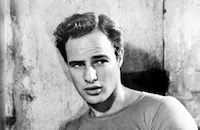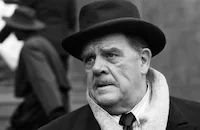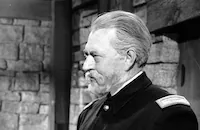The Ugly American
Brief Synopsis
Cast & Crew
George Englund
Marlon Brando
Eiji Okada
Sandra Church
Pat Hingle
Arthur Hill
Film Details
Technical Specs

Synopsis
Harrison Carter MacWhite is appointed ambassador to the new nation of Sarkhan in Southeast Asia, despite objections from several members of the Senate Foreign Relations Committee. A former newsman, MacWhite is a longtime friend of Deong, revolutionary leader of the government opposition who led the struggle for his country's independence. MacWhite and his wife, Marion, arrive in Sarkhan and fight off a rioting crowd which greets them at the airport. MacWhite contacts Deong and tries to persuade him to end his opposition to Freedom Road, a U. S.-built highway which the rebel leader considers to be an example of Western imperialism. Deong refuses, mouthing propaganda, and MacWhite brands him a Communist and terminates their relationship. He then ignores the advice of Homer Atkins, supervising engineer of the road project, by suggesting to Prime Minister Kwen Sai that they shift the path of the road northward, thereby driving a wedge into the heart of the Communist stronghold. In return, MacWhite assures Kwen Sai of U. S. military support should there be intervention by foreign Communist troops. Deong learns of the plan, aligns himself with the local Communists, and leads a revolt. He succeeds in forcing Kwen Sai to admit defeat, but he is betrayed by the Communists when they bring in outside troops, take over the northern part of the country, and then assassinate him. Before dying, he urges his followers to form a coalition with Kwen Sai and the local government. Realizing that despite his good intentions he has bungled his assignment, MacWhite resigns from his post. He explains in an interview with the press that to help the countries of Southeast Asia, Americans must understand their internal problems before inflicting a way of life upon them. As his words are carried to the United States by television, an uninterested viewer switches off his set.

Director
George Englund
Cast

Marlon Brando

Eiji Okada
Sandra Church

Pat Hingle

Arthur Hill

Jocelyn Brando
Kukrit Pramoj

Judson Pratt
Reiko Sato
George Shibata
Judson Laire

Philip Ober
Yee Tak Yip
Stefan Schnabel
Pock Rock Ann

Carl Benton Reid
Simon Scott
Frances Helm

James Yagi
John Day
Leon Lontoc
Bill Stout
Crew
Sasidhorn Bunnag
Oliver Emert
George Englund
Robert Forrest
Larry Germain
Joseph Gershenson
Bill Gilmore
Alexander Golitzen
Marshall Green
Ted J. Kent
Joe Lapis
Edward Muhl
Terence Nelson
Rosemary Odell
Kukrit Pramoj
Frank Skinner
Stewart Stern
Clifford Stine
Alfred Sweeney
Waldon O. Watson
James Welch
Bud Westmore

Film Details
Technical Specs

Quotes
Trivia
Notes
Location scenes filmed in Thailand.

Miscellaneous Notes
Released in United States Spring May 5, 1963
Released in United States Spring May 5, 1963











